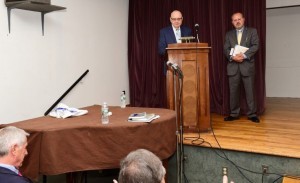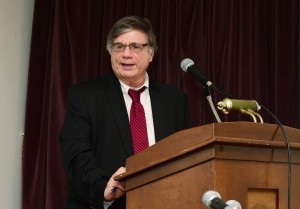On Sunday September 24, 2017, the Pan-Pontian Federation of USA and Canada in collaboration with another 15 organizations celebrated the publication of the new book “Genocide in the Ottoman Empire: Armenians, Assyrians, and Greeks, 1913-1923”, at the Hellenic Cultural Center in Astoria. The book consists of academic papers presented at the 2013 Academic Conference that the Asia Minor and Pontos Hellenic Research Center (AMPHRC) organized at the Holocaust Museum in Skokie, Illinois.
The event featured a keynote presentation by the editor of the book and noted historian Mr. George Shirinian. Mr. Shirinian is the Executive Director of the Zoryan Institute, an international institute that studies the Armenian genocide— and a long standing friend and supporter of the Center. The book presentation was followed by questions from the audience, and discussion coordinated by Kostas Tsilfidis, president of the PanPontian Federation and a board member of the AMPHRC.
Mr Shirinian took pains to show that we gain much better understanding of what happened to Greeks, Armenians and Assyrians – before, during, and at the aftermath of WWI— if we study the events as ‘Ottoman genocides’, thus signaling the fact that there was a single orchestrated effort by Turkish regimes (Ottoman and Kemalist) to destroy all non-Muslim, Christian people in what is now the modern state of Turkey. The genocides of the three ethnic groups—Armenians, Assyrian, and Greeks—consisted in systematic violence against them, boycotts, deportations, and massacres.
Mr. Shirinian emphasized that “We study our history with the vision to better understand ourselves, to help explain what our people have gone through to the rest of the world, and to be able to pass on our historical and cultural legacy to the next generation, so that they understand profoundly what it means to be Greek or Armenian.” He continued that it was not the Christianity of the ethnic groups alone that was the culprit for the genocides. It was also the tension between the Muslim ruling elite and the prosperous non-Muslims, which were better able to benefit from commerce with Europeans and technological and other economical advances of the time. Such tension is also found in the Nazi rhetoric against the Jews of Germany. Just like during the Nazi era, the non-Muslims of the Ottoman empire were the targets of envy, resentment, suspicion, hostility, and eventually, extreme violence. Nearly a century of reforms in the Ottoman empire in the 19th century leading up to the genocides failed, because the Muslim Turks, the “ruling nation,” were incapable of accepting non-Muslim, non-Turk fellow citizens as their equals.
Mr. Shirinian emphasized that the new book Genocide in the Ottoman Empire is the latest tangible effort towards advancing an integrated study of the three genocides. While the era is generally known for the Armenian Genocide, it was actually the Greeks of Eastern Thrace who were targeted for destruction first, beginning in 1912. In order to solidify Turkish claims to this territory during the Balkan Wars, the Ottoman government deported and expelled some 332,000 Greeks. This deportation was done without warning and in intentionally brutal ways. Approximately 15,690 Greeks were massacred in Eastern Thrace in 1912 and 1913, and about half the deportees to Central Anatolia perished. Meanwhile, Armenians, Assyrians and Greeks had been conscripted into the Ottoman army, but being distrusted, were disarmed and formed into labour battalions, where they were put to work under the harshest conditions, clearly designed to lead to their deaths. Eventually, all the Armenian soldiers were murdered outright, with similar fates for the Greeks and Assyrians. Mass killings, deportations, and exile applied, likewise, to all three ethnic groups.
The fate of the three peoples was closely intertwined, and their experiences were nearly identical. Today, the continuing persecutions of Christian and other minority populations by the Islamic state in the middle east and Africa, and the massive human rights violations currently observed in those regions— that target, again, Christians— makes the study of the Ottoman genocides as contemporary and urgent as ever. By studying the first genocides of the 21st century in that region, we gain insight into the conditions that produce violence and draw lessons for public policy about how to prevent such tragic events from re-occurring.
Ultimately, the study of the Ottoman genocides is a step to restore historical memory, and defend human dignity.
Later Mr. George Mavropoulos (Founder and President of AMPHRC’s) presented in a quick overview the activities and the main objectives of the Center:
– Conduct original research
– Organize public lectures, seminars and conferences, educational programs
– Reprint old historical books –no longer available
– Publish books, journals and other forms of media
– Translate and publish historical books
– Collect historical and archival material
– Provide scholarships to younger scholars to specialize in the field of history
– The next years 2009 and 2010 two more Academic Conferences were organized and the original research papers were published in 2012.
In January of 2013 the Research Center was founded as a non-for-profit organization to carry on the vision, mission and goals set in 2008. The same year the Research Center with the support of the Pan-Pontian Federation organized the first International Academic Conference with the Armenian and Assyrian communities of Chicago. In 2015 again the second International Academic Conference was organized and presented in New York sponsored by the Pan-Pontian Federation of USA and Canada.
The research papers presented in 2013 were published in April of 2017 in a book titled “Genocide in the Ottoman Empire: Armenians, Assyrians, and Greeks 1913-1923.” The Research currently is working on the editing and publication of the research papers presented in 2015, the concise volume of The Genocide of Greeks in Pontos, and a Documentary on The Great Catastrophe and the Forgotten Genocide.
For more information, please contact the Asia Minor and Pontos Hellenic Research Center, tel (312) 964-5120 or visit the website www.hellenicresearchcenter.
Ask me anything
Explore related questions







